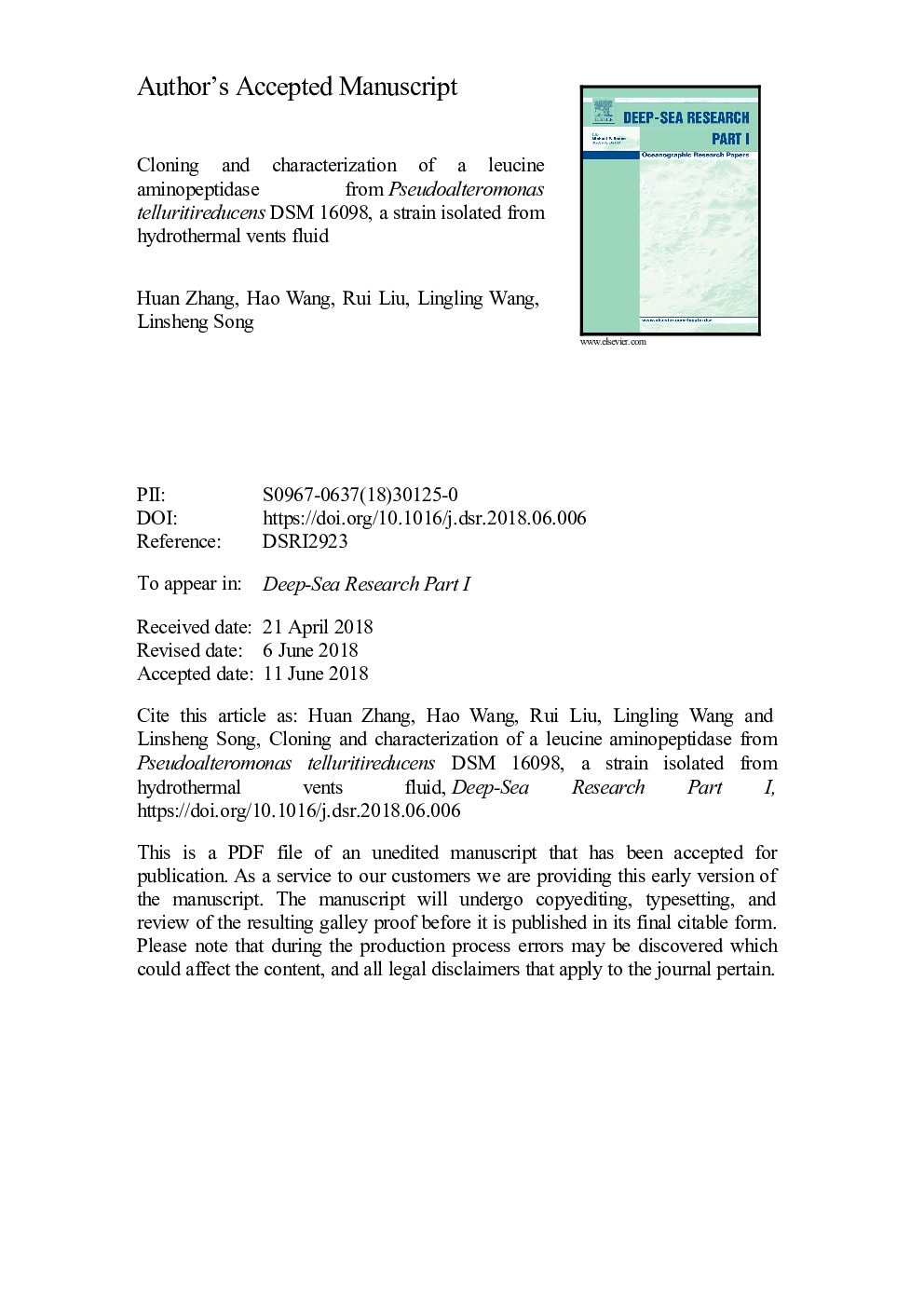| کد مقاله | کد نشریه | سال انتشار | مقاله انگلیسی | نسخه تمام متن |
|---|---|---|---|---|
| 8884201 | 1626292 | 2018 | 40 صفحه PDF | دانلود رایگان |
عنوان انگلیسی مقاله ISI
Cloning and characterization of a leucine aminopeptidase from Pseudoalteromonas telluritireducens DSM 16098, a strain isolated from hydrothermal vents fluid
دانلود مقاله + سفارش ترجمه
دانلود مقاله ISI انگلیسی
رایگان برای ایرانیان
کلمات کلیدی
موضوعات مرتبط
مهندسی و علوم پایه
علوم زمین و سیارات
زمین شناسی
پیش نمایش صفحه اول مقاله

چکیده انگلیسی
Microbes living around hydrothermal vents have developed lots of enzymes with specific characteristics that allow them to thrive in the environment. Extracellular enzyme leucine aminopeptidases (LAPs) are all metallopeptidases that catalyze the hydrolysis of leucine residues from N-terminal residues from peptides and proteins. Genomic analysis of Pseudoalteromonas telluritireducens DSM 16098, a strain of deep-sea bacteria isolated from hydrothermal vents fluid, revealed the presence of an LAP gene (designated as PtLAP). The open reading frame of PtLAP encodes a protein of 614 amino acids (GenBank accession no. KY429939), consisting of a signal peptide, a peptidase_M1 domain and a leuk-A4-hydro_C domain. The putative substrate binding site GGMEN, zinc-binding motif HEXXHX18E and the catalytic residues involved in aminopeptidase activity are all conserved, indicating PtLAP is a member of M1 leucine aminopeptidases. The recombinant PtLAP expressed in Escherichia coli Transetta (DE3) (designated as rPtLAP) exhibits a significant LAP activity to hydrolyze L-leucine 7-amido-4-methylcoumarin (MAC-L). The optimal activity of rPtLAP is observed at pH 7.2 and 28â¯Â°C with half-saturation coefficient (Km) of 44.56â¯Â±â¯5.09 μmol Lâ1. rPtLAP activity is relatively stable at 30-40â¯Â°C and exhibits a relatively wide pH range (6.0-12.5) with the maximal activity ranging at pH 7.2-8.0. It can be inhibited by EDTA, protease inhibitors and some metal ions including Cu2+, Zn2+ and Cd2+, but is relatively tolerant to Mn2+ which is enriched in hydrothermal vent fluids. Furthermore, rPtLAP can significantly promote the proliferation of tumor cells, including the cell lines HCT116, BEL-7402 and Hela, while displays no effect on that of normal cell 3T3. These results together suggest that the extracellular enzyme PtLAP executes the degradation of organic matters, contributes to the adaptive survival of microbe in deep-sea environment and may play important roles in marine biogeochemical cycles.
ناشر
Database: Elsevier - ScienceDirect (ساینس دایرکت)
Journal: Deep Sea Research Part I: Oceanographic Research Papers - Volume 138, August 2018, Pages 114-121
Journal: Deep Sea Research Part I: Oceanographic Research Papers - Volume 138, August 2018, Pages 114-121
نویسندگان
Huan Zhang, Hao Wang, Rui Liu, Lingling Wang, Linsheng Song,